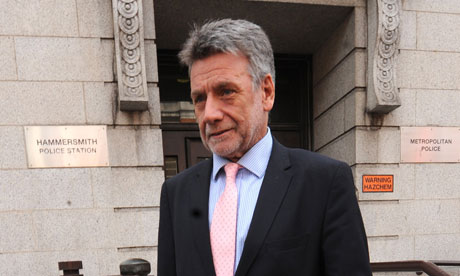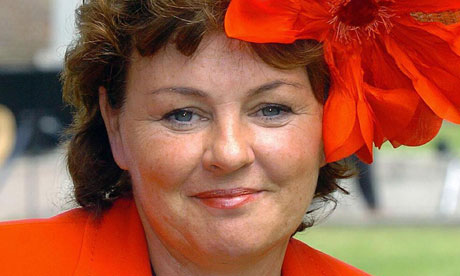
Former News of the World deputy editor Neil Wallis leaving Hammersmith police station in July. Photograph: Murray Sanders/Mail On Sunday
The relationship between the police and the News of the World has come under fire again amid revelations that Neil Wallis, the former deputy editor of the News of the World, was paid by the paper's publisher for "crime exclusives" while working for the Metropolitan police.
Wallis was secretly paid more than £25,000 by News International after he left the paper and got a contract to work two days a month as a PR consultant with the Met. One story earned him a single payment of £10,000.
The Daily Telegraph claims that internal records obtained by Scotland Yard show that he was paid for providing News International with details of a suspected assassination attempt on the Pope during his visit to the UK last year.
A spokesman for Scotland Yard said the contract it had with Wallis's PR firm, Chamy Media, "had a confidentiality clause, a data protection act clause and a conflict of interest clause within it".
He added that Wallis did not have access to the Met's IT systems.
The revelations that Wallis received money from News International while working for Scotland Yard will raise questions about conflicts of interest.
Last month, it emerged that Andy Coulson, the former editor of the News of the World, continued to receive payments from News International as part of a severance deal after he was employed by the Tory party as its director of communications.
Wallis's solicitor has made a complaint alleging that the police had leaked the information regarding the payments.







 11:55
11:55
 El NACHO
El NACHO



 No amount of money can absolve News International from hacking in to the phone of Surrey murder victim Milly Dowler, Liberal Democrat leader Nick Clegg has said , following the disclosure that the company was about to settle its case with the teenager's family. Rupert Murdoch is set to donate £1 million to charity from his own pocket, while the Dowlers themselves will receive in the region of £2 million in a separate payout from News International, the publishers of the now-closed News of the World. The company has confirmed it is in "advanced negotiations" with relatives of the 13-year-old, who was abducted and killed by Levi Bellfield in 2002. On Tuesday Mr Clegg said no amount of money could absolve the company for what happened. He said: "It is not for me to decide what money News International offer the Dowlers. I think it is very, very important we now give the Dowler family the time and space they need to rebuild their lives and move on. "I think the reason why people were so outraged by the invasion of the privacy of the Dowler family is that they weren't celebrities, they weren't politicians, they hadn't asked to be put on the front page of the nation's newspapers. I have met them and they are a lovely, strong, every-day family who lost their daughter and were dealing with that terrible tragedy and even then these journalists - it's just grotesque - were invading their privacy. "In a sense I think, and I am sure the Dowlers feel the same, that no amount of money can absolve people for what they did." News International is reported to have set aside £20 million for payments to phone hacking victims, but a source said the size of the expected compensation for the Dowlers reflected the "wholly exceptional circumstances" of their case. Sources close to the Dowlers have said any agreement will feature a donation to charity. It is not yet known which cause, or causes, would benefit. A News International spokesman said: "News International confirms it is in advanced negotiations with the Dowler family regarding their compensation settlement. No final agreement has yet been reached, but we hope to conclude the discussions as quickly as possible."
No amount of money can absolve News International from hacking in to the phone of Surrey murder victim Milly Dowler, Liberal Democrat leader Nick Clegg has said , following the disclosure that the company was about to settle its case with the teenager's family. Rupert Murdoch is set to donate £1 million to charity from his own pocket, while the Dowlers themselves will receive in the region of £2 million in a separate payout from News International, the publishers of the now-closed News of the World. The company has confirmed it is in "advanced negotiations" with relatives of the 13-year-old, who was abducted and killed by Levi Bellfield in 2002. On Tuesday Mr Clegg said no amount of money could absolve the company for what happened. He said: "It is not for me to decide what money News International offer the Dowlers. I think it is very, very important we now give the Dowler family the time and space they need to rebuild their lives and move on. "I think the reason why people were so outraged by the invasion of the privacy of the Dowler family is that they weren't celebrities, they weren't politicians, they hadn't asked to be put on the front page of the nation's newspapers. I have met them and they are a lovely, strong, every-day family who lost their daughter and were dealing with that terrible tragedy and even then these journalists - it's just grotesque - were invading their privacy. "In a sense I think, and I am sure the Dowlers feel the same, that no amount of money can absolve people for what they did." News International is reported to have set aside £20 million for payments to phone hacking victims, but a source said the size of the expected compensation for the Dowlers reflected the "wholly exceptional circumstances" of their case. Sources close to the Dowlers have said any agreement will feature a donation to charity. It is not yet known which cause, or causes, would benefit. A News International spokesman said: "News International confirms it is in advanced negotiations with the Dowler family regarding their compensation settlement. No final agreement has yet been reached, but we hope to conclude the discussions as quickly as possible."
 Police bail sports writer Raoul Simons A total of 16 people have now been arrested as part of the investigation into phone hacking Continue reading the main story Phone-hacking scandal Q&A: Phone-hacking scandal Key people and profiles Timeline Inquiries and legal challenges A 35-year-old man held by officers probing phone hacking at the News of the World has been bailed, police say. The BBC understands he is sports journalist Raoul Simons who used to work at London's Evening Standard before moving to the Times in 2009. The man was bailed on suspicion of conspiracy to intercept voicemails. Meanwhile, Guardian reporter Amelia Hill has been questioned under caution over alleged police leaks surrounding the hacking inquiry, the paper said. It followed the arrest of a Met Police detective constable last month who worked in the Operation Weeting team. Scotland Yard says the "investigation continues" and they are not giving a "running commentary" on events. Mr Simons was appointed deputy football editor at the Times in August 2009, having previously worked at the Evening Standard. In September 2010, he went on extended leave after material allegedly linking him to phone hacking emerged. He is still on the payroll but has not returned to work since. It is understood he has not been involved in any inappropriate behaviour while at the Times. The man has been bailed by police to a date in October pending further inquiries. A total of 16 people have now been arrested on suspicion of phone hacking - 15 of whom are still under investigation - since Operation Weeting was launched in January. Scotland Yard's fresh investigation was set up to examine the illegal interception of voicemails. Former News International chief executive Rebekah Brooks and ex-Downing Street communications chief Andy Coulson are among those who have already been arrested as part of the inquiry. The scandal has led Met Police Commissioner Sir Paul Stephenson and Assistant Commissioner John Yates to resign, and the News of the World to close down after 168 years.
Police bail sports writer Raoul Simons A total of 16 people have now been arrested as part of the investigation into phone hacking Continue reading the main story Phone-hacking scandal Q&A: Phone-hacking scandal Key people and profiles Timeline Inquiries and legal challenges A 35-year-old man held by officers probing phone hacking at the News of the World has been bailed, police say. The BBC understands he is sports journalist Raoul Simons who used to work at London's Evening Standard before moving to the Times in 2009. The man was bailed on suspicion of conspiracy to intercept voicemails. Meanwhile, Guardian reporter Amelia Hill has been questioned under caution over alleged police leaks surrounding the hacking inquiry, the paper said. It followed the arrest of a Met Police detective constable last month who worked in the Operation Weeting team. Scotland Yard says the "investigation continues" and they are not giving a "running commentary" on events. Mr Simons was appointed deputy football editor at the Times in August 2009, having previously worked at the Evening Standard. In September 2010, he went on extended leave after material allegedly linking him to phone hacking emerged. He is still on the payroll but has not returned to work since. It is understood he has not been involved in any inappropriate behaviour while at the Times. The man has been bailed by police to a date in October pending further inquiries. A total of 16 people have now been arrested on suspicion of phone hacking - 15 of whom are still under investigation - since Operation Weeting was launched in January. Scotland Yard's fresh investigation was set up to examine the illegal interception of voicemails. Former News International chief executive Rebekah Brooks and ex-Downing Street communications chief Andy Coulson are among those who have already been arrested as part of the inquiry. The scandal has led Met Police Commissioner Sir Paul Stephenson and Assistant Commissioner John Yates to resign, and the News of the World to close down after 168 years.